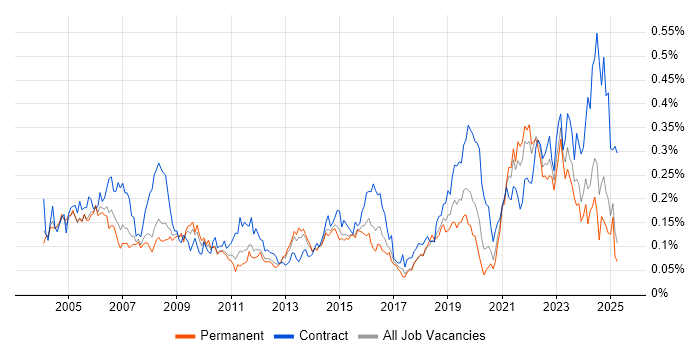VMS
England > South East
The table below provides summary statistics for permanent job vacancies advertised in the South East requiring VMS skills. It includes a benchmarking guide to the annual salaries offered in vacancies that cited VMS over the 6 months leading up to 1 May 2025, comparing them to the same period in the previous two years.
| 6 months to 1 May 2025 |
Same period 2024 | Same period 2023 | |
|---|---|---|---|
| Rank | 280 | 351 | 364 |
| Rank change year-on-year | +71 | +13 | +51 |
| Permanent jobs citing VMS | 8 | 46 | 52 |
| As % of all permanent jobs advertised in the South East | 0.095% | 0.28% | 0.35% |
| As % of the Operating Systems category | 0.72% | 1.60% | 1.79% |
| Number of salaries quoted | 8 | 39 | 37 |
| 10th Percentile | £26,250 | £41,000 | £35,400 |
| 25th Percentile | £41,250 | £48,750 | £36,250 |
| Median annual salary (50th Percentile) | £52,500 | £57,500 | £47,500 |
| Median % change year-on-year | -8.70% | +21.05% | -32.14% |
| 75th Percentile | £59,688 | £64,375 | £53,750 |
| 90th Percentile | £64,000 | £69,750 | £72,500 |
| England median annual salary | £65,000 | £57,500 | £47,500 |
| % change year-on-year | +13.04% | +21.05% | -32.14% |
All Operating Systems
South East
VMS falls under the Operating Systems category. For comparison with the information above, the following table provides summary statistics for all permanent job vacancies requiring operating system skills in the South East.
| Permanent vacancies with a requirement for operating system skills | 1,110 | 2,884 | 2,904 |
| As % of all permanent jobs advertised in the South East | 13.11% | 17.28% | 19.38% |
| Number of salaries quoted | 837 | 2,332 | 2,004 |
| 10th Percentile | £27,000 | £25,760 | £25,750 |
| 25th Percentile | £31,500 | £31,250 | £30,500 |
| Median annual salary (50th Percentile) | £42,500 | £42,500 | £42,500 |
| Median % change year-on-year | - | - | -10.53% |
| 75th Percentile | £58,750 | £58,750 | £60,000 |
| 90th Percentile | £71,350 | £70,000 | £77,500 |
| England median annual salary | £46,323 | £45,000 | £52,500 |
| % change year-on-year | +2.94% | -14.29% | - |
VMS
Job Vacancy Trend in the South East
Job postings citing VMS as a proportion of all IT jobs advertised in the South East.

VMS
Salary Trend in the South East
3-month moving average salary quoted in jobs citing VMS in the South East.
VMS
Salary Histogram in the South East
Salary distribution for jobs citing VMS in the South East over the 6 months to 1 May 2025.
VMS
Job Locations in the South East
The table below looks at the demand and provides a guide to the median salaries quoted in IT jobs citing VMS within the South East region over the 6 months to 1 May 2025. The 'Rank Change' column provides an indication of the change in demand within each location based on the same 6 month period last year.
| Location | Rank Change on Same Period Last Year |
Matching Permanent IT Job Ads |
Median Salary Past 6 Months |
Median Salary % Change on Same Period Last Year |
Live Jobs |
|---|---|---|---|---|---|
| Surrey | +63 | 3 | £57,500 | -14.81% | 7 |
| Thames Valley | +57 | 2 | £47,500 | -9.52% | 6 |
| Berkshire | +48 | 2 | £47,500 | -9.52% | 3 |
| East Sussex | +39 | 2 | £27,500 | -52.17% | 1 |
| Kent | +33 | 1 | £60,000 | -2.04% | 1 |
| VMS England |
|||||
VMS
Co-occurring Skills and Capabilities in the South East by Category
The follow tables expand on the table above by listing co-occurrences grouped by category. The same employment type, locality and period is covered with up to 20 co-occurrences shown in each of the following categories:
